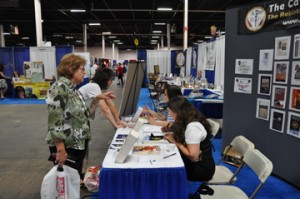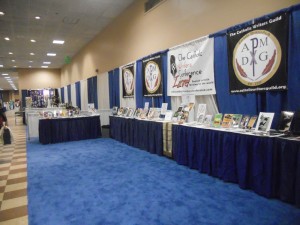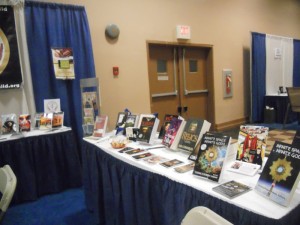 You’ve just typed The End on your manuscript, your gloriously awesome book that’s going to rocket to the top of the New York Times best seller list! Editors are going to line up at your door, fighting to be the one privileged enough to publish your work. Thousands of people will stand in line for your signature at book signings, and you’d better clear your schedule for the television talk show circuit. Oh, and make sure your bank account is big enough to hold all the moolah that the USPS is going to deliver to your door. You are on your way, baby!
You’ve just typed The End on your manuscript, your gloriously awesome book that’s going to rocket to the top of the New York Times best seller list! Editors are going to line up at your door, fighting to be the one privileged enough to publish your work. Thousands of people will stand in line for your signature at book signings, and you’d better clear your schedule for the television talk show circuit. Oh, and make sure your bank account is big enough to hold all the moolah that the USPS is going to deliver to your door. You are on your way, baby!
Except…no one is knocking. In fact, no one is even lurking in the shrubbery. And when it comes down to details, you’re not entirely sure how to get the attention of those New York editors, or even agents. You’ve been talking up your project to all your relatives, your friends, even your acquaintances. You’ve let a select few read your work (you deserve to be paid for it, after all!), and they rave about it! Why, it’s better than (fill in the blank with your favorite—and very rich—author)!
What to do???
This is what: set up a systematic, professional plan for querying.
It’s going to require hard work, persistence, and a thick skin to sell your work. If you do this part right, you’ll have a much better chance of actually getting published. And if your work rises above the fray, you may make it to that rarefied atmosphere of best seller-dom. If you do it wrong, you’ll get nowhere in traditional publishing.
A query letter, whether submitted via email or hard copy, is a one-page business letter with a fairly standard format. It is brief, professional in tone, and your only chance to connect with some agents or editors. Let’s look at the elements of the letter, and some common pitfalls to avoid, as well:
Research your targeted agent/editor. Make sure s/he is interested in the type of project you are pitching. Don’t send your speculative fiction to an agent who represents cookbooks and memoirs. Make sure they are accepting new clients. Then, send an individually addressed letter to the specific person—and spell their name right. The advent of email queries has tempted too many authors to try the ‘Dear Sir or Madam’, multiple-recipient approach. Sound like spam to you? It does to the recipients, and most delete without reading. I can’t stress these items strongly enough. I follow several agents on Twitter, and the biggest reasons for not reading past the first paragraph of the query letter are included in this list.
Cutesy doesn’t work. Use white paper if submitting via hard copy, or no background wallpaper on your email submission. Use standard fonts and font sizes. Times New Roman 12 works well; beautiful flowing script fonts don’t. Remember, this is business—on your end and on theirs.
Pitch finished projects. Keep in mind agents get thousands of queries a month. An unfinished manuscript isn’t competitive.
Only include personal information as it relates to your project. Your family, hobbies, other career, etc., are not fodder for this letter. If your story has strong elements that include fighter pilots or dulcimer players, and you are a fighter pilot or a dulcimer player, then include that; otherwise, as fascinating as your background is, it’s irrelevant. Also, resist the urge to say that your mother (or best friend, or spouse, etc.) thinks yours is the best book ever. Let the agent or editor be the judge.
Do include any writing credits. I’ve had interesting responses with this. At a pitch session for book length fiction, I sat with one editor who literally wadded up my nonfiction writing credits and threw them away. Clearly, he was unimpressed. However, the next editor was quite taken with the same information and spent time exploring it. Those credits lifted my submission above the standard in her mind. Bottom line: it doesn’t hurt to include writing credits. At the very least, it demonstrates that another editor somewhere thinks your work is worth publishing, and that you have experience with the editorial process. Always list membership in writing organizations and contest wins or placements. Again, some agents/editors value this more than others. But if you don’t toot your own horn, they’ll never know.
Keep it professional and polite. A query letter is a great place for confidence, but not such a good place for an overinflated ego. If you have a critique group, run your query letter past them. Sometimes they can see an area you need to emphasize more, or can suggest better wording. As an aside, one of my critique partners discovered she was pitching the wrong aspect of her story. Once she corrected that, her queries began getting responses.
So the basic format is:
Dear Ms. Specific Name Spelled Correctly,
I am seeking representation for my completed, xxx-thousand computer word count (name of genre) manuscript, Best Book Since War and Peace, set in (time, place). (If the story has a theme that is unique, you may wish to include it here.)
The next two paragraphs are like the back cover blurb would be for the book. Generally, one paragraph for the main character, the second for the other lead. Go to the bookstore (or your private library) for examples. Your goal here is to give a solid sense of the plot, a taste of your voice, but not a synopsis with lots of details or the resolution of the story.
The fourth paragraph will list your writing credits.
Close with a polite ‘I hope to hear from you soon’ and make sure to include your contact information.
Keep a spreadsheet or record of your queries. Make notes; don’t be afraid to follow up after a reasonable time (usually listed on the website), but don’t stalk. The publishing community is a small one; take care to develop your reputation as one of consummate professionalism. Divas and stalkers have no place in the business.
Query. A lot. Set aside time, set a specific goal, and keep the queries flowing. Follow the submission guidelines on the websites; they differ. Evaluate your responses and adjust future queries accordingly. But keep at it. And continue to work on improving your craft. If you’ve significantly revised and improved a project, don’t be afraid to re-query. Agents and editors really are looking for great stuff to publish. Give your work its best chance to catch their eye.
There are lots of sites and books out there that are great resources. Check with your writing organization for reputable agents, and make sure agents you query are members of the Association of Author’s Representatives. *No legitimate agent will ever charge a fee for reading your work.
What have your experiences with querying been like? Any advice? Questions? I hope this post helps rocket your work to the status of ‘sold and published’ – and best seller-dom!











